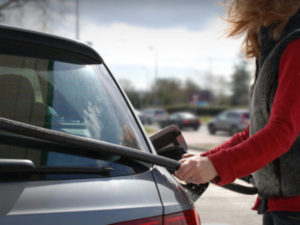Government to crack down on ‘rip-off’ fuel retailers with live pricing comparisons
Supermarkets and other fuel retailers will be forced to provide up-to-date price information as part of a new government scheme to clamp down on “rip-off” fuel retailers.

The new live pricing scheme will force retailers to make data available for third parties, enabling price comparison apps and websites
The Department for Energy Security and Net Zero said the new fuel price reporting scheme would enable drivers to easily see forecourts charging fair prices while exposing retailers with rip-off prices.
It follows yesterday’s report from the UK’s competitions watchdog which called for live fuel data after finding supermarkets’ increased fuel margins lead to drivers paying an extra 6ppl last year and 13ppl on diesel for the first five months of 2023.
The Competitions and Market Authority report called for a new fuel finder scheme which would make it compulsory for retailers to make their prices available in real time – backed by a new ‘fuel monitor’ oversight body.
The Government has now said it’s preparing to force retailers to “publicly fess up to how much they are charging at the pump”.
It will change the law to force retailers to comply by providing up-to-date price information, which is expected to lead to greater transparency and competition – in turn driving down prices amid the cost-of-living crisis.
The new scheme will make pricing data available for third parties – paving the way for them to create price comparison apps and websites.
The Department for Energy Security and Net Zero also pledged to hand new powers to a public organisation – yet to be decided – which will then closely monitor the UK road fuel market, scrutinise prices and alert the Government if further intervention is needed.
Grant Shapps, Energy Security Secretary, said: “Some fuel retailers have been using motorists as cash cows – they jacked up their prices when fuel costs rocketed but failed to pass on savings now costs have fallen.
“It cannot be right that at a time when families are struggling with rising living costs, retailers are prioritising their bottom line, putting upwards pressure on inflation and pocketing hundreds of millions of pounds at the expense of hardworking people.
“Today I’m putting into action the CMA’s recommendations and standing by consumers – we’ll shine a light on rip-off retailers to drive down prices and make sure they’re held to account by putting into law new powers to increase transparency.”
The Petrol Retailers Association, which represents independent fuel retailers, welcomed the Government’s commitment to transparency and said it would support any “sensible” steps taken to help motorists find the best deal available to them.
Gordon Balmer, executive director of the PRA, said: “We will continue to engage with officials to ensure that this scheme is rolled out efficiently. The logistics surrounding fuel pricing are complicated and it is vital that the Government consult with industry to ensure a smooth implementation.
“Independent forecourts represented by the PRA comprise 65% of the fuel network, with the CMA report noting an increase in the extent to which individual non-supermarket retailers are pricing more cheaply than the supermarket national average price. These smaller, independent forecourts operate as a crucial part of local communities, often knowing customers personally.”
The Government will consult on the design of the open data scheme and market monitoring function this autumn – with changes to the law needed to bring it in.
In the meantime, the CMA will create a voluntary scheme encouraging fuel retailers to share accurate, up-to-date road fuel prices for publication by August and continue to monitor fuel prices using its existing powers.
A similar scheme in Germany boosted competition amongst fuel retailers. Meanwhile, motorists who shopped around in Queensland, Australia, saved on average $93 per year off the back of a statewide scheme rolled out in the area.
The CMA has urged drivers to shop around for fuel too; it says that by seeking the lowest fuel prices as effectively as possible, the driver of a typical family car could save up to £4.50 a tank within a five-minute drive.















